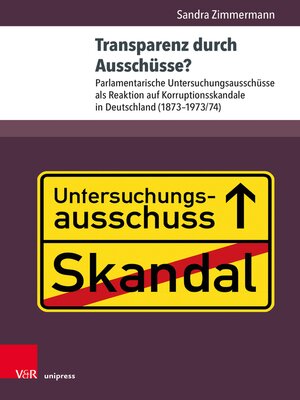Transparenz durch Ausschüsse?
ebook ∣ Parlamentarische Untersuchungsausschüsse als Reaktion auf Korruptionsskandale in Deutschland (1873–1973/74)
By Sandra Zimmermann

Sign up to save your library
With an OverDrive account, you can save your favorite libraries for at-a-glance information about availability. Find out more about OverDrive accounts.
Find this title in Libby, the library reading app by OverDrive.



Search for a digital library with this title
Title found at these libraries:
| Library Name | Distance |
|---|---|
| Loading... |
Dem Begriff »Transparenz« kam erst ab den 1970er-Jahren eine politische Bedeutung zu. Dennoch zeigt Sandra Zimmermann anhand von sechs Fallbeispielen, dass bereits seit dem Deutschen Kaiserreich über Transparenz diskutiert wurde. Sie wurde insbesondere als ein Gegenmittel zu Korruption begriffen und somit im Zusammenhang mit Korruptionsskandalen gefordert. Parlamentarische Untersuchungsausschüsse bzw. -kommissionen, die häufig zur Aufklärung solcher Skandale eingesetzt wurden, spielten dabei eine wichtige Rolle. In ihnen wurde Transparenz gefordert und über sie diskutiert. Die Ausschüsse sollten durch transparente Ermittlungen den Skandal untersuchen, das Parlament reinigen und die Bevölkerung beruhigen./p> The term "transparency" only gained political significance from the 1970s onwards. Nevertheless, Sandra Zimmermann shows, on the basis of six case studies, that transparency has been discussed since the German Empire (Kaiserreich). It was understood as an antidote to corruption and thus demanded in connection with corruption-scandals. Parliamentary committees of enquiry or commissions of enquiry, which were often set up to investigate such scandals, played an important role in this context. Transparency was demanded and discussed in them. The committees were supposed to investigate the scandal through transparent investigations, to cleanse parliament and to reassure the population after such a scandal.







